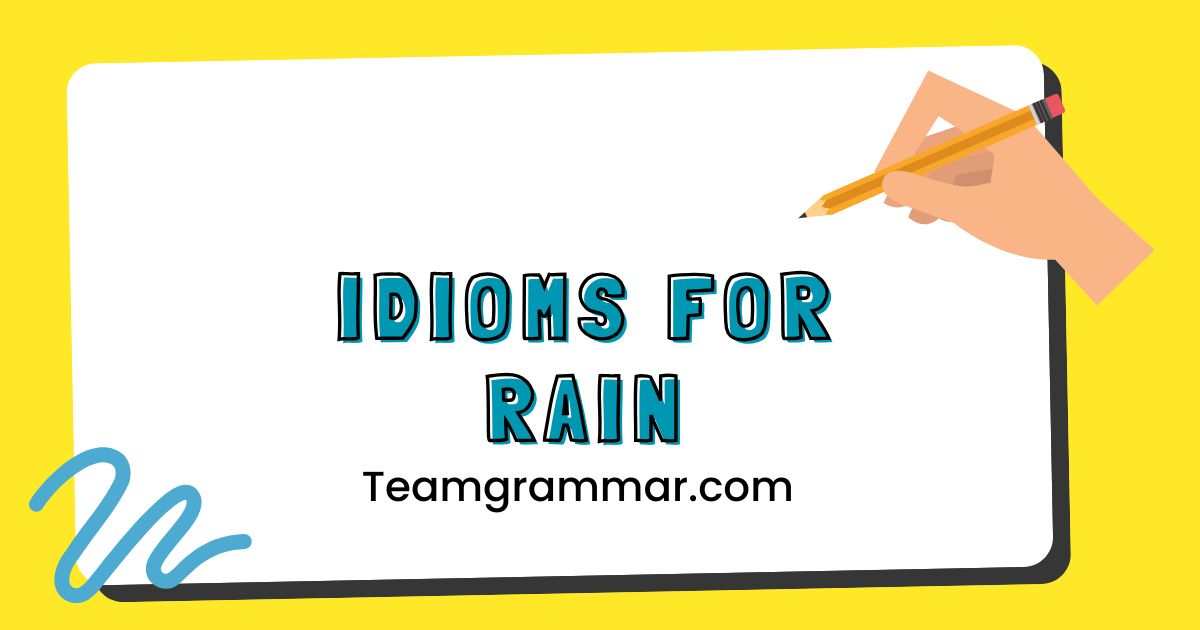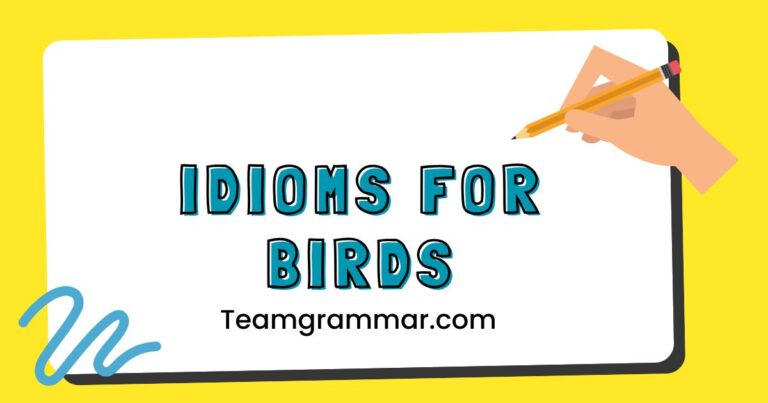23 Idioms for Rain: Mastering Figurative Language in English
Understanding idioms is crucial for mastering the English language. Idioms add color and depth to communication, allowing speakers and writers to express nuanced meanings in a vivid and memorable way.
This article focuses specifically on idioms related to rain, exploring their meanings, origins, and usage. By learning these idioms, English language learners can enhance their comprehension, fluency, and overall communication skills.
This guide is suitable for intermediate to advanced English learners, as well as anyone interested in expanding their knowledge of English figurative language.
Idioms related to rain often convey ideas about abundance, adversity, or cleansing. They paint vivid pictures and offer a unique perspective on everyday experiences.
Recognizing and using these idioms correctly can significantly improve your ability to understand native speakers and express yourself more naturally.
Table of Contents
- Definition of Idioms for Rain
- Structural Breakdown of Rain Idioms
- Types and Categories of Rain Idioms
- Examples of Rain Idioms
- Usage Rules for Rain Idioms
- Common Mistakes with Rain Idioms
- Practice Exercises
- Advanced Topics in Rain Idioms
- Frequently Asked Questions
- Conclusion
Definition of Idioms for Rain
An idiom is a phrase or expression whose meaning cannot be understood from the literal meanings of the individual words within it. Instead, an idiom’s meaning is figurative and culturally specific.
Idioms for rain are phrases that use the concept of rain to convey a different, non-literal meaning. These idioms are a subset of figurative language, which includes metaphors, similes, and other expressions that use words in a non-literal sense.
Idioms related to rain often evoke strong imagery and can add depth and color to language. They are used in both spoken and written English and are an essential part of understanding native speakers and expressing oneself fluently.
The context is crucial in understanding the meaning of an idiom; without the right context, the literal interpretation of the words can be misleading.
Classification: Rain idioms fall under the broader category of idioms, which are a type of figurative language. They can further be classified based on the specific meaning they convey, such as abundance, difficulty, cleansing, or emotional expression.
Function:The primary function of rain idioms is to add richness and nuance to communication. They allow speakers to express complex emotions or situations in a concise and vivid manner.
They can also serve to make language more engaging and memorable.
Contexts:Rain idioms are used in a variety of contexts, including everyday conversations, literature, news reports, and business communications. The specific context will often influence the choice of idiom and its interpretation.
For example, an idiom used in a formal business setting might be different from one used in a casual conversation with friends.
Structural Breakdown of Rain Idioms
The structure of rain idioms can vary, but they typically involve a combination of nouns, verbs, and adjectives that relate to rain or weather. Understanding the structural elements can help in recognizing and interpreting these idioms.
Noun Phrases: Many rain idioms include noun phrases that refer to rain, such as “a rain cloud,” “a rain check,” or “a shower of.” These noun phrases often carry a figurative meaning that is different from their literal interpretation.
Verb Phrases: Verb phrases in rain idioms often describe actions related to rain, such as “raining cats and dogs,” “when it rains, it pours,” or “to rain on someone’s parade.” These verb phrases convey a sense of intensity, misfortune, or interference.
Adjectival Phrases: Some rain idioms include adjectival phrases that modify nouns related to rain, such as “under the weather.” While not directly referring to rain, this idiom uses weather as a metaphor for feeling unwell.
The following table illustrates the structural breakdown of some common rain idioms:
| Idiom | Structural Elements | Literal Meaning | Figurative Meaning |
|---|---|---|---|
| Raining cats and dogs | Verb (raining), Nouns (cats, dogs) | Literally, cats and dogs falling from the sky | Raining very heavily |
| When it rains, it pours | Verb (rains, pours), Pronoun (it) | When rain falls, it falls heavily | When bad luck occurs, it occurs in abundance |
| To rain on someone’s parade | Verb (to rain), Noun (parade), Pronoun (someone’s) | To cause literal rain on a parade | To spoil someone’s enjoyment or plans |
| Take a rain check | Verb (take), Noun (rain check) | To literally take a ticket for a rainy day | To postpone an offer or invitation |
Understanding these structural elements and how they contribute to the overall meaning of the idiom is crucial for mastering their usage.
Types and Categories of Rain Idioms
Rain idioms can be categorized based on the specific meaning they convey. This classification can help in understanding the different nuances and contexts in which these idioms are used.
1. Idioms of Abundance:These idioms use the concept of rain to describe a large quantity or a plentiful supply of something.
Examples include “raining cats and dogs” (heavy rain) and “when it rains, it pours” (misfortunes come in abundance).
2. Idioms of Adversity:These idioms use the imagery of rain to represent difficult or challenging situations.
Examples include “every cloud has a silver lining” (hope in difficult situations) and “to be under the weather” (feeling unwell).
3. Idioms of Interruption:These idioms use rain to symbolize interference or disruption.
An example is “to rain on someone’s parade” (to spoil someone’s enjoyment or plans).
4. Idioms of Postponement:These idioms use the idea of rain to suggest delaying or rescheduling something.
The primary example is “take a rain check” (postpone an offer or invitation).
5. Idioms of Cleansing/Renewal:While less common, some rain idioms can evoke the idea of cleansing or renewal, similar to how rain washes away dirt and brings new life to the earth.
Examples are more metaphorical and less direct, but the association can be present.
Examples of Rain Idioms
This section provides extensive examples of rain idioms, organized by category, to illustrate their usage and meaning. Each example is presented in a sentence to provide context.
Idioms of Abundance
These idioms are used to describe situations where something is present in large quantities.
| Idiom | Meaning | Example Sentence |
|---|---|---|
| Raining cats and dogs | Raining very heavily | “We had to cancel the picnic because it was raining cats and dogs.” |
| When it rains, it pours | When bad luck occurs, it occurs in abundance | “First, I lost my job, and then my car broke down; when it rains, it pours.” |
| A shower of something | A large amount of something | “The bride received a shower of gifts at her wedding.” |
| Pour down | To rain heavily | “The rain started to pour down just as we reached the bus stop.” |
| Rain buckets | To rain very heavily | “It’s really raining buckets out there; I’m soaked just from walking to the car.” |
| Come down in sheets | To rain very heavily | “The rain came down in sheets, making it impossible to see the road.” |
| A deluge of | A severe flood; a heavy downpour | “The town experienced a deluge of rain, causing widespread flooding.” |
| A cloudburst | A sudden, very heavy rainfall | “We got caught in a cloudburst and were drenched within seconds.” |
| In buckets | Raining heavily | “It was raining in buckets so we decided to stay inside.” |
| Drizzling | Light rain falling in fine drops | “It was just drizzling when I left the house, but it quickly turned into a downpour.” |
| Spitting | Raining very lightly | “It’s just spitting out there, you probably don’t need an umbrella.” |
| A downpour | A heavy fall of rain | “The afternoon downpour caught everyone by surprise.” |
| Drenching rain | Rain that soaks you completely | “We got caught in drenching rain and were soaked to the bone.” |
| Torrential rain | Very heavy rain | “The torrential rain caused flash floods in the valley.” |
| A monsoon | A season of heavy rain | “The monsoon season brings much-needed water to the region.” |
| A sprinkle | A very light rain | “There was just a sprinkle, hardly enough to wet the ground.” |
| Bucketing down | Raining heavily | “It’s bucketing down outside, so bring an umbrella.” |
| Teeming down | Raining heavily | “It was teeming down all afternoon, so we stayed inside and played board games.” |
| Soaking rain | Rain that soaks things thoroughly | “The soaking rain helped the plants grow quickly.” |
| Sheet rain | Heavy rain that appears to fall in a sheet | “The sheet rain obscured the view from the window.” |
Idioms of Adversity
These idioms use rain to represent difficult or challenging situations.
| Idiom | Meaning | Example Sentence |
|---|---|---|
| Every cloud has a silver lining | There is something positive in every difficult situation | “Even though she lost her job, she believes that every cloud has a silver lining.” |
| Under the weather | Feeling unwell | “I’m feeling a bit under the weather today, so I’m staying home from work.” |
| Weather the storm | To survive a difficult situation | “The company managed to weather the storm of the economic recession.” |
| Come rain or shine | Regardless of the circumstances | “Come rain or shine, I’ll be there to support you.” |
| In a fog | Confused or disoriented | “I’ve been in a fog since I got the news.” |
| A storm brewing | Trouble is coming | “I can sense a storm brewing between them; they’ve been arguing a lot lately.” |
| Chase rainbows | To pursue unrealistic goals | “He’s always chasing rainbows, trying to find shortcuts to success.” |
| Face the music | To accept the consequences of one’s actions | “It’s time for him to face the music and admit his mistakes.” |
| On cloud nine | Extremely happy | “She’s been on cloud nine ever since she got engaged.” |
| Keep a weather eye on | To watch carefully for changes or dangers | “We need to keep a weather eye on the stock market.” |
| When the chips are down | When facing a difficult situation | “You’ll find out who your true friends are when the chips are down.” |
| Full of hot air | Empty talk or boasting | “Don’t listen to him; he’s just full of hot air.” |
| Walking on sunshine | Feeling very happy and positive | “Ever since she started her new job, she’s been walking on sunshine.” |
| Cloud over | To become gloomy or sad | “Her face clouded over when she heard the bad news.” |
| Silver lining | A positive aspect in a negative situation | “Losing the competition was disappointing, but the silver lining is that we learned a lot.” |
| Down in the dumps | Feeling sad or depressed | “He’s been down in the dumps since his favorite team lost.” |
| A dark cloud hanging over | A feeling of impending doom or sadness | “There’s been a dark cloud hanging over the company since the scandal broke.” |
| Clear skies ahead | A positive outlook for the future | “With the project completed, it’s clear skies ahead for the team.” |
| Stormy relationship | A relationship with many arguments and disagreements | “They have a stormy relationship, always fighting and making up.” |
| Between a rock and a hard place | Stuck between two difficult options | “I’m between a rock and a hard place; if I quit, I’ll be broke, but if I stay, I’ll be miserable.” |
Idioms of Interruption
These idioms use rain to symbolize interference or disruption.
| Idiom | Meaning | Example Sentence |
|---|---|---|
| To rain on someone’s parade | To spoil someone’s enjoyment or plans | “I don’t want to rain on your parade, but I think your idea is unrealistic.” |
| Steal someone’s thunder | To take credit for someone else’s idea or accomplishment | “He always tries to steal my thunder at meetings.” |
| Throw a wet blanket on | To discourage enthusiasm or enjoyment | “I hate to throw a wet blanket on your excitement, but we need to consider the risks.” |
| Burst someone’s bubble | To shatter someone’s illusion or happy feeling | “I didn’t want to burst her bubble, but I had to tell her the truth about the situation.” |
| Pour cold water on | To discourage or disapprove of something | “The manager poured cold water on my proposal.” |
| Clip someone’s wings | To limit someone’s freedom or potential | “His overprotective parents clip his wings and prevent him from exploring his interests.” |
| Put a damper on | To lessen the enjoyment or enthusiasm | “The bad news put a damper on the party.” |
| Throw a wrench in the works | To disrupt or sabotage a plan | “His sudden resignation threw a wrench in the works of the project.” |
| Rain check | A promise to do something later | “I’ll have to take a rain check on that offer.” |
| Raining on my head | Facing many problems at once | “It’s like everything is raining on my head lately.” |
Idioms of Postponement
These idioms use the idea of rain to suggest delaying or rescheduling something.
| Idiom | Meaning | Example Sentence |
|---|---|---|
| Take a rain check | Postpone an offer or invitation | “I’m busy tonight, but can I take a rain check on that dinner invitation?” |
| Put on ice | To postpone or delay something | “We had to put the project on ice due to budget constraints.” |
| Shelve | To postpone or put aside for later | “We decided to shelve the plan for now and revisit it later.” |
| Call off | To cancel an event | “They had to call off the game because of the heavy rain.” |
| Hold off | To delay or postpone something | “We’ll hold off on making a decision until we have more information.” |
| Table | To postpone discussion of a topic | “Let’s table this discussion until the next meeting.” |
Usage Rules for Rain Idioms
Using rain idioms correctly involves understanding their specific meanings and the contexts in which they are appropriate. Here are some general rules to follow:
- Understand the Meaning: Before using an idiom, ensure you fully understand its figurative meaning. Using an idiom incorrectly can lead to confusion or miscommunication.
- Consider the Context: Idioms are often context-dependent. Use them in situations where they are appropriate and relevant. For example, using “raining cats and dogs” might be suitable in a casual conversation but not in a formal business presentation.
- Be Aware of Cultural Differences: Idioms can be culturally specific. What is common in one culture may not be understood in another. Be mindful of your audience and use idioms that are likely to be understood.
- Avoid Overuse: While idioms can add color to language, overuse can make your speech or writing sound unnatural or forced. Use them sparingly and appropriately.
- Use Correct Grammar: Ensure that the idiom is grammatically correct within the sentence. Pay attention to verb tenses, subject-verb agreement, and other grammatical rules.
Exceptions and Special Cases:Some idioms have variations in their usage depending on the region or dialect. For example, the exact wording of an idiom might differ slightly in British English compared to American English.
Be aware of these variations and use the form that is most appropriate for your audience.
Common Mistakes with Rain Idioms
English language learners often make mistakes when using rain idioms. Here are some common errors and how to avoid them:
- Literal Interpretation: Interpreting idioms literally is a common mistake. Remember that the meaning of an idiom is figurative and cannot be understood from the individual words.
- Incorrect Wording: Changing the wording of an idiom can alter its meaning or make it nonsensical. Use the correct form of the idiom as it is commonly known.
- Misunderstanding the Context: Using an idiom in an inappropriate context can lead to confusion. Ensure that the idiom is relevant and suitable for the situation.
- Overusing Idioms: Using too many idioms can make your speech or writing sound unnatural. Use them sparingly and appropriately.
The table below shows some correct and incorrect examples of using rain idioms:
| Incorrect | Correct | Explanation |
|---|---|---|
| “It’s raining dogs and cats.” | “It’s raining cats and dogs.” | The correct order of the animals is “cats and dogs.” |
| “Every cloud has a gold lining.” | “Every cloud has a silver lining.” | The correct metal is “silver,” not “gold.” |
| “I’ll take a rain ticket.” | “I’ll take a rain check.” | The correct term is “rain check,” not “rain ticket.” |
| “He rained on my parade.” | “He rained on my parade.” | Correct usage of the idiom. |
| “Feeling under the climate.” | “Feeling under the weather.” | The correct phrase is “under the weather”, not “under the climate.” |
Practice Exercises
Test your understanding of rain idioms with these practice exercises. Choose the correct idiom to complete each sentence.
Exercise 1: Fill in the Blanks
Choose the correct idiom from the list below to complete each sentence.
(raining cats and dogs, when it rains, it pours, take a rain check, every cloud has a silver lining, under the weather)
| Question | Answer |
|---|---|
| 1. I’m feeling a bit ____ today, so I’m staying home from work. | under the weather |
| 2. We had to cancel the game because it was ____. | raining cats and dogs |
| 3. I’m busy tonight, but can I ____ on that dinner invitation? | take a rain check |
| 4. Even though I failed the exam, I know that ____. | every cloud has a silver lining |
| 5. First, I lost my wallet, and then I missed the bus; ____. | when it rains, it pours |
| 6. I think I am coming down ____. | under the weather |
| 7. Let’s ____ on that coffee date. | take a rain check |
| 8. The streets were flooded because it was ____. | raining cats and dogs |
| 9. She always says that ____ in every situation. | every cloud has a silver lining |
| 10. I lost my key, and now I’ve spilled coffee all over my shirt; ____. | when it rains, it pours |
Exercise 2: Multiple Choice
Choose the best idiom to complete the sentence.
| Question | Options | Answer |
|---|---|---|
| 1. He didn’t want to ____, but he had to tell her the truth. | (a) rain on her parade (b) take a rain check (c) under the weather (d) when it rains, it pours | (a) rain on her parade |
| 2. _____, I’ll be there to support you. | (a) Every cloud (b) Take a check (c) Come rain or shine (d) Raining cats | (c) Come rain or shine |
| 3. The project was ____ due to budget constraints. | (a) under the weather (b) raining cats and dogs (c) put on ice (d) silver lining | (c) put on ice |
| 4. I can sense ____ between them. | (a) a storm brewing (b) a silver lining (c) a rain check (d) cats and dogs | (a) a storm brewing |
| 5. She’s been ____ ever since she got the promotion. | (a) under the weather (b) on cloud nine (c) raining cats and dogs (d) taking a rain check | (b) on cloud nine |
| 6. We’ll have to ____ that discussion until the next meeting. | (a) table (b) rain check (c) pour (d) cloud | (a) table |
| 7. He’s always ____, trying to find shortcuts to success. | (a) raining cats and dogs (b) chasing rainbows (c) under the weather (d) stealing thunder | (b) chasing rainbows |
| 8. It’s time for him to ____ and admit his mistakes. | (a) weather the storm (b) chase rainbows (c) face the music (d) steal thunder | (c) face the music |
| 9. His overprotective parents ____ and prevent him from exploring his interests. | (a) pour cold water on (b) clip his wings (c) take a rain check (d) rain cats and dogs | (b) clip his wings |
| 10. The bad news ____ the party. | (a) took a rain check on (b) put a damper on (c) rained cats and dogs (d) was under the weather | (b) put a damper on |
Advanced Topics in Rain Idioms
For advanced learners, exploring the etymology and historical context of rain idioms can provide a deeper understanding of their meaning and usage. Researching the origins of idioms like “raining cats and dogs” or “every cloud has a silver lining” can reveal fascinating insights into the cultural and historical influences that shaped the English language.
Furthermore, analyzing the use of rain idioms in literature and media can enhance comprehension and appreciation of figurative language. Pay attention to how authors and speakers use these idioms to convey specific emotions, create vivid imagery, and add depth to their narratives.
Consider the nuances and subtleties of their usage and how they contribute to the overall message.
Studying regional variations in rain idioms can also be beneficial for advanced learners. Different regions and dialects may have their own unique idioms related to rain, reflecting local weather patterns and cultural experiences.
Exploring these variations can broaden your understanding of the diversity and richness of the English language.
Frequently Asked Questions
- What is an idiom?
An idiom is a phrase or expression whose meaning cannot be understood from the literal meanings of the individual words. Instead, an idiom’s meaning is figurative and culturally specific. Idioms are a form of figurative language and add depth and color to communication.
- Why is it important to learn idioms?
Learning idioms is important because they are commonly used in both spoken and written English. Understanding idioms can improve your comprehension, fluency, and overall communication skills. It also helps you understand cultural nuances and express yourself more naturally.
- How can I learn new idioms?
There are several ways to learn new idioms. You can read books, watch movies, and listen to podcasts in English. Pay attention to how native speakers use idioms in conversations. You can also use online resources, such as dictionaries and idiom lists, to expand your vocabulary.
- What is the meaning of “raining cats and dogs”?
“Raining cats and dogs” means that it is raining very heavily. The origin of this idiom is uncertain, but it is believed to have originated in the 16th or 17th century, possibly from the sight of animals being washed away during heavy storms.
- What does “every cloud has a silver lining” mean?
“Every cloud has a silver lining” means that there is something positive or hopeful in every difficult situation. This idiom suggests that even in the darkest times, there is always a glimmer of hope or a positive aspect to be found.
- How do I use “take a rain check” in a sentence?
You can use “take a rain check” to politely decline an invitation or offer and suggest postponing it to a later date. For example, “I’m busy tonight, but can I take a rain check on that dinner invitation?”
- What is the difference between an idiom and a metaphor?
An idiom is a phrase with a figurative meaning that is different from the literal meaning of the individual words, while a metaphor is a figure of speech that directly compares two unrelated things without using “like” or “as.” Idioms are fixed expressions, while metaphors can be more creative and flexible.
- How can I avoid misusing idioms?
To avoid misusing idioms, make sure you fully understand their meanings and the contexts in which they are appropriate. Use online resources and dictionaries to verify the correct usage. Practice using idioms in sentences and get feedback from native speakers.
- Is it okay to use idioms in formal writing?
While idioms can add color to your writing, it’s generally best to avoid using them in formal writing, such as academic papers or business reports. Formal writing requires a more precise and straightforward style. However, idioms can be appropriate in less formal contexts, such as blog posts or personal essays.
- What are some other idioms related to weather?
Besides rain idioms, there are many other idioms related to weather, such as “under the weather” (feeling unwell), “weather the storm” (survive a difficult situation), “a fair-weather friend” (someone who is only there for you when things are good), and “clear as mud” (unclear or confusing).
Conclusion
Mastering idioms for rain is a valuable step in enhancing your English language skills. These idioms add richness and nuance to communication, allowing you to express complex ideas and emotions in a vivid and memorable way.
By understanding their meanings, origins, and usage rules, you can improve your comprehension, fluency, and overall communication effectiveness.
Remember to practice using these idioms in various contexts and to be mindful of cultural differences. Avoid common mistakes by ensuring you fully understand the figurative meanings and using them appropriately.
Continue to explore and expand your knowledge of English idioms to become a more confident and proficient communicator. Happy learning!







